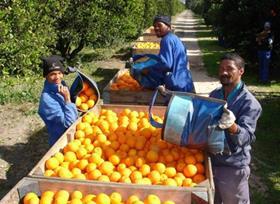
While South African citrus growers steam ahead with production and export growth seldom seen before in the history of the industry, there are events outside their control which will substantially affect their future businesses in South Africa, as well as how they deal with traditional markets in the UK and Europe.
The first southern African citrus forecast of the season shows that the third successive record crop in a row will be exported this year. However, while the two previous years represented steep increases, this year’s volumes will only be marginally higher than last year. What is important to note is that during the past five years export production grew from a volume of below 100 million cartons to close to 140m cartons this year.
The South African Citrus Growers Association (CGA) announced that close to 137m cartons will be exported this year to no less than 100 countries.
By 2025 the total export volume is expected to reach 160m cartons. The question is just where all this fruit will be sold. Events that could change trading relations with the traditional markets of the UK and Europe – where between 750,000 and 800,000 tonnes of South African citrus will have to be sold in the coming years – is of particular importance.
With the key debate on Brexit and just how it will affect South African exports still unresolved and South Africa still at odds with the EU on the issue of Citrus Black Spot, it is not surprising that there is considerable unease about what will happen after the end of March this year.
At the same time South Africans are going to the polls in May this year to elect a new government in the post-Zuma era. After years of corruption the government-controlled state institutions, such as electricity, water, transport and other infrastructure, are in a mess. On top of this, the government has committed to advancing its land restitution plan, through seizure of land without compensation. This is eroding confidence inside and outside the industry and is scaring off investors in the country.
Therefore, if citizens in the UK and EU feel that they have massive problems dealing with Brexit and other world issues, they should gaze down south to the end of Africa. Here their oldest fresh produce supply partners are also struggling.
As all wait for Brexit to be finalised, South Africans will still be part of the customs union’s Economic Partnership Agreement (EPA) with the EU. So on the EU side nothing much will change. The South African Parliament has also been asked to ratify a new trade agreement between the UK and the Southern African Customs Union plus Mozambique (SACU+M). The governments of the SACU+M countries have been negotiating an agreement with the UK to ensure trade continuity upon the UK’s exit from the EU.
Recent announcements by the UK government about new tariffs, which will be applied in the case of a hard Brexit, will have been noted too. The next few weeks will bring more clarity, but citrus sources say they are hoping that in the long term South African citrus will benefit from the UK being outside of the EU.



